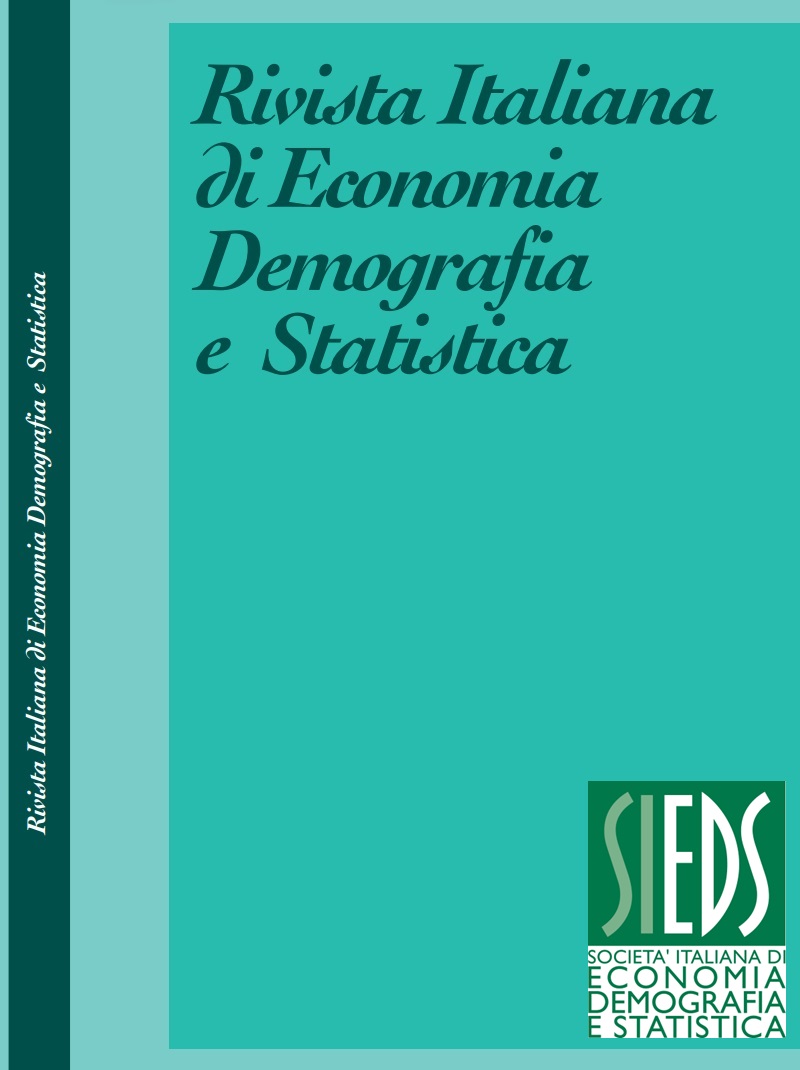Italian Official Development Assistance (ODA): A territorial perspective
DOI:
https://doi.org/10.71014/sieds.v79i4.374Keywords:
Cooperation, ODA, 2030 AgendaAbstract
Official Development Assistance (ODA) promotes the economic development and welfare of developing countries. Its relevance has increased constantly since 1970 when the UN set the target of 0.7% of GNI for donor countries. This goal has been further reaffirmed by SDG 17.2 of the 2030 Agenda. In the last few years, there has been a growing strand of literature attempting to disentangle the development efforts of donor countries. Still, little emphasis has been put on the “local” dimension of aid on the donor side. This paper examines the flows of Italian Official ODA for project-based interventions and international scholarships, funded by local administrations and Italian public universities. Using OECD data, we examine the regional distribution, the sectoral allocation, the type of interventions, and the geographical orientation of ODA in the years 2019 and 2021. In addition, we carry out an exploratory econometric exercise to understand whether regional ODA flows follow a similar dynamic to that of trade flows between the recipient country and the region, using a simple gravity model. Results show that Italy’s ODA is mostly concentrated in a few Regions and focuses on a limited number of key sectors, addressing specific countries. We discuss the implications of these findings for the coherence and effectiveness of the development cooperation policy.
References
ANDERSON J. 1979. A theoretical foundation for the gravity equation. American Economic Review, Vol. 69, No. 1, pp. 106–116.
ANDERSON J. E., VAN WINCOOP E. 2003. Gravity with gravitas: A solution to the border puzzle. American Economic Review, Vol. 93, No. 1, pp. 170–192. DOI: https://doi.org/10.1257/000282803321455214
ARMENISE M. 2023. Monitoring the SDGs in Puglia region, Italy. STAMOS, I., VEGA RAPUN, M. (Eds.), Luxembourg Publications Office of the European Union, JRC Research Reports, JRC134403, Joint Research Centre.
BIRDSALL, N., KHARAS, H., MAHGOUB, A., PERAKIS, R. 2010. Quality of Official Development Assistance Assessment. Working Paper 3228, eSocialSciences.
EATON, J., KORTUM S. 2002. Technology, geography, and trade, Econometrica, Vol. 70, No. 5, pp. 1741–1779. DOI: https://doi.org/10.1111/1468-0262.00352
HYNES W, SCOTT S. 2013. The Evolution of Official Development Assistance: Achievements, Criticisms and a Way Forward. Paris: OECD Development Co-operation Working Papers, No. 12, OECD Publishing.
LELLA L., OSES-ERASO N. 2023. Monitoring the SDGs at regional level in EU. REGIONS2030 pilot project Final Report, Stamos, I. and Manfredi, R. editor(s), Publications Office of the European Union, Luxembourg, 2023, doi:10.2760/567651, JRC135594.
MOSLEY, P. 1985. The Political Economy of Foreign Aid: A Model of the Market for a Public Good, Economic Development and Cultural Change, Vol. 33, No. 2, pp. 373-393. DOI: https://doi.org/10.1086/451466
OECD. 2023. The 0.7% ODA/GNI target - a history.
OECD. 1985. DAC Chairman's Report 1985. Paris: Organisation for Economic Co-operation and Development.
PAVIOTTI I., FATTIBENE D. 2023. Present and Future of Italy’s Development Cooperation. IAI Commentaries, No. 12.
TINBERGEN J. 1962. Shaping the World Economy: Suggestions for an International Economic Policy. New York: Twentieth Century Fund.
VENTURI B. 2019. The Trouble with Italy's Development Cooperation, IAI Commentaries, No. 37.
WANG Q., GUO J., DONG Z. 2021. The positive impact of official development assistance (ODA) on renewable energy development: Evidence from 34 Sub-Saharan Africa Countries, Sustainable Production and Consumption, Vol. 28, pp. 532-542. DOI: https://doi.org/10.1016/j.spc.2021.06.007
WANG H., WANG Y., ZHANG X., ZHANG C., 2024. The effect of foreign aid on carbon emissions in recipient countries: Evidence from China, Technological Forecasting and Social Change, Vol. 200, Article 123104. DOI: https://doi.org/10.1016/j.techfore.2023.123104
Downloads
Published
Issue
Section
License
Copyright (c) 2025 Massimo Armenise, Annamaria Fiore, Marinella Giannelli, Andrea Guida, Alessia Virga

This work is licensed under a Creative Commons Attribution 4.0 International License.



